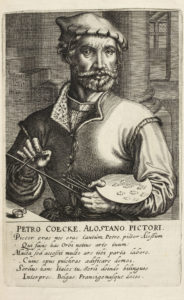
31. Pieter Coecke van Aelst
You were a painter, but, Pieter, you were not only a painter, you who made your Aelst more known to the world by this skill. But there was much skill in addition, born to you by much labour. Its office was to build beautiful houses. Serlio taught this to the Italians, then you, bilingual interpreter of Serlio, taught the Belgians and the French. Continue Reading 31. Pieter Coecke van Aelst
View →
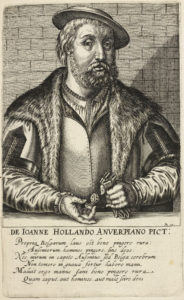
29. Jan van Amstel
The proper praise of Belgians is to paint fields well; that of Italians to paint men or gods. Nor is it surprising: not without reason is the Italian said to have his brain in his head, [while] the Belgian [has his] in his active hand. Jan’s hand, then, preferred to paint fields well, than for his head to know poorly either men or gods. Continue Reading 29. Jan van Amstel
View →
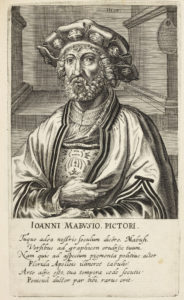
27. Jan Gossaert, called Mabuse
You too, indeed, man of Maubeuge, will be said in our verses to have educated your age in drawing. For who else could daub Apelles’ boards with flowering pigments smoother to the eye? Granted, you yield in skill to others who followed your age. [But] rare will be the guider of the brush who is equal to you. Continue Reading 27. Jan Gossaert, called Mabuse
View →
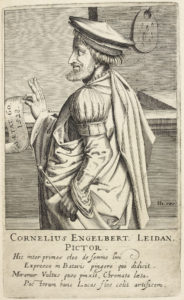
25. Cornelius Engebrechtsz
“This man was among the first of the Dutch who learnt to paint with pressed oily seed of flax. We wonder at the faces [and] joyful colours which he painted. Lucas, the flower of painters, frequented this artist.” Continue Reading 25. Cornelius Engebrechtsz
View →
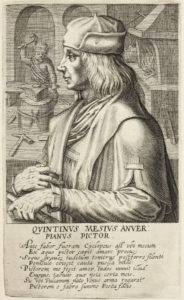
23. Quentin Matsys
Before I used to be a Cyclopean smith, but when a wooing painter began to love on an equal footing with me, and the cautious girl objected to me that she liked the heavy thundering of hammers less than the silent paintbrush, love made me a painter. A tiny hammer, which is the sure note of my paintings, alludes to this. Thus, when Venus had asked Vulcan for arms for her son, you, greatest of poets, made a painter out of a smith. Continue Reading 23. Quentin Matsys
View →
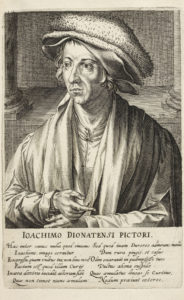
21. Joachim Patinir
That, amongst all of these, no image expressed with more liveliness than your face is to be seen, Joachim, has happened not only because Curtius’ hand cut it into the bronze ([the hand] which does not now fear another rival), but [also] because Dürer, admiring your hand, when you painted fields and huts, once drew your face on a palimpsest with his bronze point. Imitating those lines, Curtius surpassed himself, not to mention all the others. Continue Reading 21. Joachim Patinir
View →
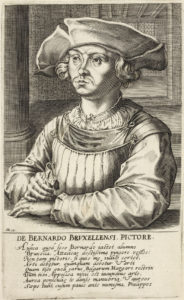
19. Bernaert Van Orley
That the Court of Brussels boasts of its nursling Bernaert, most skilled in painting Attalian garments, is not so much due (if anyone wants to argue while I am judging) to the painter’s skill (although it is also due to his skill) as it is to [the fact] that he was dear to you, Margaret ruler of the Belgians, since nothing is more delightful to you than the art of Apelles. By your gift, he often got golden handles for his paintbrushes, and gold coins, in recently minted currency. Continue Reading 19. Bernaert Van Orley
View →
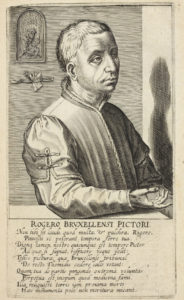
17. Rogier Van Der Weyden
May your praise not be that you painted many beautiful things, as your age could bear them (although they are worthy that anyone who is a painter in our time wish greatly to look at them, if he be wise – the paintings which forbid the tribunal of Brussels to leave the straight path of Justice are witness [to this]): but rather that your last will is a perpetual remedy for the hunger of the poor from the proceeds of your painting. The former, [itself] already near to death, you left on earth; the latter shines in the sky, as a monument that will not die. Continue Reading 17. Rogier Van Der Weyden
View →
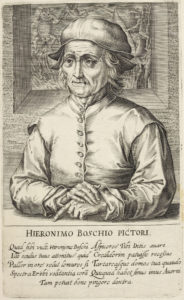
15. Hieronymus Bosch
What is meant by that astonished eye of yours, Hieronymus Bosch, or that pallor in your face? As if you had seen ghosts, the spectres of Erebus, flittering in front of you. I could believe that the caves of greedy Pluto and the houses of Tartarus lay open to you, seeing as your hand could paint so well whatever the lowest hollows of Avernus contain. Continue Reading 15. Hieronymus Bosch
View →
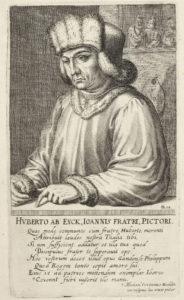
9. Hubert Van Eyck
“Hubert, if the praises which our Thalia recently attributed to you along with your deserving brother are not enough, let this [praise] of yours be added, that your brother, as your student, outdid you in ability. That work of yours in Ghent teaches this, which filled Philip with such love of it,4 that he ordered a copy of it to be made by the hand of Coxennius, to be sent to his native Spaniards.” Continue Reading 9. Hubert Van Eyck
View →











